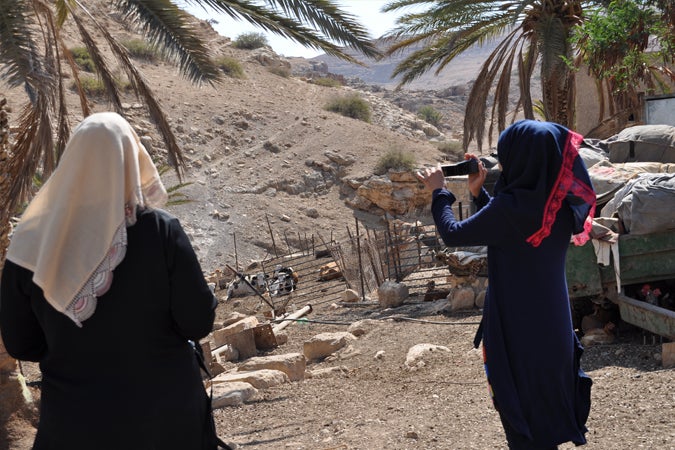In the Jordan Valley, Bedouin women filmmakers tell their own stories
Date:

In a Bedouin community in the Jordan Valley, 16-year-old Firyal lives without reliable access to health or education and her family must bring in water to their hamlet by tractor and cistern. Her community, which was declared a military zone by Israel, suffers from frequent displacement due to training exercises and nearby explosions that disturb livestock and threaten their livelihood, and now Firyal is planning to document their lives through a film.
“It is harder to capture the day to day struggles of a life without water and electricity than to film the dramatic action of when the military or the settlers come,” Firyal says of her film project, which will focus on the daily lives of women in the community.
Firyal, like other young film makers in the Jordan Valley, wants the rest of the world to see the everyday life and the challenges of her community, especially those resulting from the military’s attempts to displace the Bedouins of the Jordan Valley. She wants the world to understand that there is nowhere else for the Bedouin to go—this is their home.
With UN Women and international support, one of the leading Israeli human rights organizations in the region, B’Tselem, is training Bedouin women like Firyal in filmography as part of their work to enhance accountability for human rights violations in the Jordan Valley. The project empowers Bedouin women and offers a rare glimpse into their lives, as seen from their perspectives.
“The Bedouin community in the Jordan Valley, which is at risk of forced displacement, is not only marginalized and without reliable access to health, education or water, but also faces human rights violations with little possibility for redress or accountability,” explain Hannah Green and Helen Yanovsky from B’Tselem. “The injustice faced by women here is collective, but through the film project, their unique voice and individual perspectives emerge.”
B’Tselem now has six female volunteers in the Bedouin community of the Jordan valley and of the 200 video volunteers they support throughout the West Bank currently, 40 per cent are women.
For Khadijeh, 28, the process of making her film is as important as the final product. She finds it empowering to hold the video camera and to create a story of her life and family that will endure. She films everyday scenes from her life, such as her daughters taking tea to their grandfather tending the sheep in the field. “It is something to do to make people listen and see,” she says, as she recalls their most recent home demolition in August 2015, which the family documented through film as the children looked on.
“This is an unprecedented opportunity for these women to gain the skills of self-expression and allow us to see their world through their eyes. The importance of this project is to raise awareness of how these women cope with their harsh realities and despite all the challenges they face, to show the world the strength they carry within themselves,” said Sabine Machl, UN Women’s Special Representative to Palestine.
The project will conclude this year with the production of a series of video diaries, first of its kind from the Bedouin community, featuring each woman’s story. B’Tselem will organize public screenings of the video series for Israeli and international audiences to raise awareness about the impact of the occupation on the life and perspectives of Bedouin women, often hidden from news headlines and popular media.
Videos: